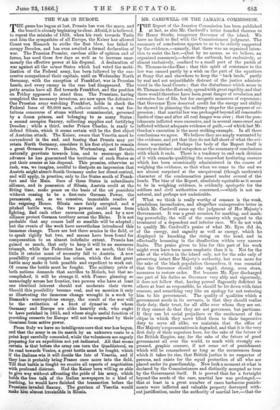THE WAR IN ElTROPE.
TTegame has begun at last, Prussia has won the move, and e board is already beginning to clear. Afraid, it is believed, to repeat the mistake of 1859, when his rush towards Turin cost him the sympathies of all Europe, the Kaiser has allowed Count von Bismark to strike the first blow, has failed to occupy Dresden, and has even awaited a formal declaration of war. The Prussian Premier, careless alike of opinion and of forms, has used these few days so well as to increase enor- mously the effective power at his disposal. A declaration of war against all the minor States which had voted the mobi- lisation of the Federal army, has been followed by the suc- cessive occupation of their capitals, until on Wednesday North Germany, with the exception of Frankfort, was in Prussian hands, and every enemy in the rear had disappeared. The petty armies have all fled towards Frankfort, and the position on Friday appeared to stand thus. The Prussians, having completed the necessary invasions, are now upon the defensive. One Prussian army watching Frankfort, holds in check the Federal force of 60,000 men, colluvies milituin, a vast for- tuitous concourse of atoms without commissariat, governed by a dozen princes, and belonging to as many States ; a second occupies Saxony, collecting supplies and fortifying Dresden ; while a third, under Prince Charles, is ready to defend Silesia, which it seems certain will be the first object of Austrian attack. The Kaiser, aware that Venetia must be surrendered in the end, and fearing that Prussia may yet retain North Germany, considers it his first object to remain a great German Power. Baden, Wurtemburg, and Bavaria naturally gravitate towards him, and to encourage their advance he has guaranteed the territories of such States as put their armies at his disposal. This promise, otherwise so rash, was, we imagine, needful to dissipate an impression that Austria might absorb South Germany under her direct control, and will apply, in practice, only to the States south of Frank- fort and the Main. Sure of these States in subordinate alliance, and in possession of Silesia, Austria could at the fitting time, make peace on the basis of the uti possidetis without ceasing to be a first-rate German Power, the permanent, and, as we conceive, immutable resolve of the reigning House. Silesia once fairly occupied, and a pitched battle won, the two powers could cease from fighting, find each other enormous gainers, and by a new alliance protect German territory across the Rhine. It is not probable that any course half so sensible will be adopted ; but the events of the week have nevertheless introduced this immense change. There are but three armies in the field, or to speak rigidly but two, and means have been found for compensation to an almost indefinite extent. Prussia has gained so much, that only to keep it will be an enormous triumph, while the Federation has lost so much, that the little it retains must of necessity fall to Austria. A new possibility of compromise has arisen, which the first great battle may make it both possible and expedient to work out. Of course the battle must be fought. The military pride of both nations demands that sacrifice to Moloch, but that ac- complished, it will be strange if, with France glancing so menacingly across her frontier, two powers who have at least one identical interest should not moderate their views. Should this possibility become real, and we mention it only as illustrating the immense change wrought in a week by Bismark's unscrupulous energy, the result of the war will be the extinction of a knot of dynastres of whom Germany and Europe are alike heartily sick, who ought to have perished in 1815, and whose single useful function of providing consorts for Europe will not be suspended by their dismissal from active power.
From Italy we have no intelligence save that war has begun, and that the army is on its march by an unknown route to a point kept carefully concealed, while the volunteers are eagerly preparing for an expedition not yet indicated. All that seems certain is that before the army can turn the Quadilateral, on its road towards Venice, a great battle must be fought, which if the Italians 'win it will decide the fate of Venetia, and if they lose it probably bring France once more into the field. Till that battle is fought we receive all reports of negotiation with profound distrust. Had the Kaiser been willing or able to give way without affronting the pride of his army, which holds the free talk of the Italian newspapers in a kind of loathing, he would have finished the transaction before the Prussians invaded Saxony. The garrison of Venetia would make him almost irresistible in Silesia.






























 Previous page
Previous page